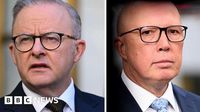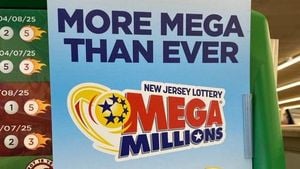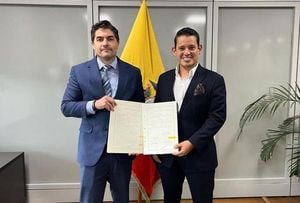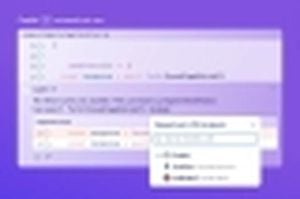Australians headed to the polls on Saturday, May 3, 2025, as the nation faced pressing issues including a cost-of-living crisis and housing affordability. The election featured Prime Minister Anthony Albanese from the center-left Labor Party and opposition leader Peter Dutton from the conservative coalition, both of whom acknowledged the challenging environment that Australia finds itself in today.
With the global political landscape feeling the impact of the second Trump administration, Australia, a key U.S. ally, grapples with the dual pressures of relying on American security while also depending on trade with China. This precarious balance adds to the electorate's anxiety, particularly as the country confronts rising prices and diminishing optimism about its economic resilience.
As the cost-of-living crisis looms large, voters are more concerned about their everyday expenses than the broader geopolitical issues. Recent polling indicates that the Albanese government may secure a second term, reversing earlier trends that had shown Dutton's coalition in the lead. However, both parties have proposed only modest measures to address the economic challenges facing Australians.
During a heated final debate, both candidates were challenged to name the price of a dozen eggs, a staple that has seen a price increase of 13.5% over the past year, resulting in Albanese estimating it at 7 Australian dollars, while Dutton guessed around half that. This misstep highlights the disconnect between politicians and the everyday experiences of voters. Political scientist Shaun Ratcliff noted, "It’s the hip pocket nerve. Under which government would you be better off?"
Albanese's term has not been without its challenges; a significant low was the failure of a 2023 referendum aimed at granting Aboriginal Australians representation in Parliament, a key promise of his administration. Dutton, who opposed this measure, has also faced criticism for his stance on Indigenous recognition, claiming that such acknowledgments are "overdone." His alignment with some of Trump’s rhetoric, particularly around “wokeness,” has not resonated well with the median voter.
In a political landscape marked by compulsory voting, Australians have increasingly turned away from the two major parties, favoring independent candidates and minor parties. Chris Wallace, a political historian, remarked that this shift signals a clear discontent with mainstream political offerings, especially among younger voters who seek more substantial solutions to pressing issues.
On election day, both Albanese and Dutton cast their votes in their respective electorates—Dutton in Dickson and Albanese in Grayndler, where he has served since 1996. Both leaders were accompanied by family members, reinforcing the personal stakes in this election.
As part of the election festivities, some candidates in Sydney have turned to gig economy platforms like Airtasker to hire individuals to distribute “how-to-vote” cards at polling booths, with budgets ranging from $100 to $120. This innovative approach reflects the competitive nature of modern campaigning.
Adding a light-hearted twist to the election, Uber Eats offered a “democracy sausage” delivery service in select cities, allowing voters to order sausages to their homes as they cast their ballots. For every sausage sold, $3.50 was donated to Australian Red Cross partners. However, not all voters found this initiative appealing, with some experiencing less-than-ideal sausage quality.
In the Blaxland electorate, key issues included Palestine, gun crime, and the cost of living. Local voter Mufeeza expressed her support for independent candidate Ahmed Ouf, citing his stance on Palestine. Others in the area voiced their concerns about crime and housing affordability, indicating a diverse set of priorities among constituents.
At Parramatta west public school, volunteers from different parties mingled amicably, despite the heightened tensions of the campaign. Warren Gardener, a long-time Labor volunteer, noted a significant turnaround for Labor in recent months, while young Liberal volunteers expressed concern over the cost-of-living crisis.
Voting extended beyond Australia, with tens of thousands of citizens casting their ballots at 111 overseas locations in 83 countries, the largest number in history for a federal election. This included new voting opportunities in places such as the Maldives and Kolkata, India.
In Bondi, local voters expressed confidence in independent candidate Allegra Spender, while others remained cautious due to past election experiences. The vibrant atmosphere at polling stations reflected a community spirit, with families enjoying democracy sausages and engaging in discussions about the election.
Creative names for democracy sausages, such as the "Dutton Dog Classic" and the "Teal Gourmet Roll," emerged at various polling places, showcasing the playful side of Australian democracy. However, some voters lamented the rising costs of these beloved election treats, with prices now reaching as high as $7.
As the election unfolded, Dutton made his 17th visit to a petrol station, holding a sign promoting a 25-cent discount on fuel, emphasizing the importance of economic issues in his campaign. The Coalition aimed to reclaim the seat of Reid from Labor’s Sally Sitou, who won it in 2022.
In a climate where voter engagement is crucial, the election results will likely reflect the electorate's desire for change and a response to the pressing issues of the day. With a growing trend toward independent candidates and a dissatisfaction with traditional party politics, the future of Australian governance may be shifting.





